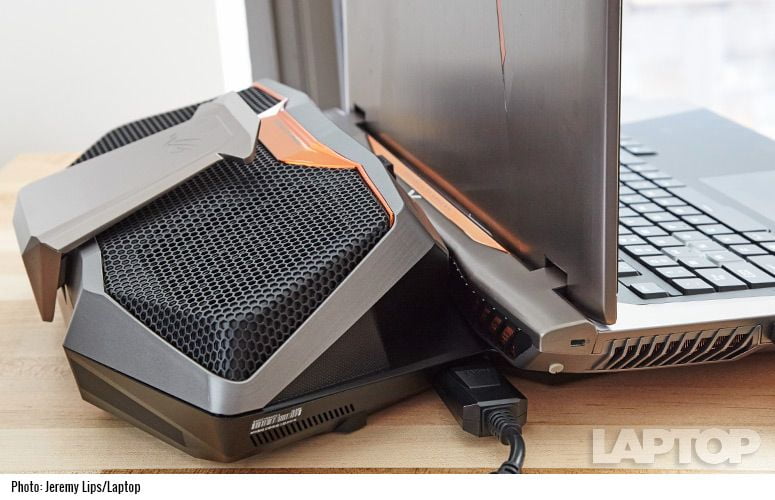
“That looks like a f***ing space cruiser!”
“WTF is that thing?”
“That’s not a laptop, it’s a space engine!”
“Who, why? What’s it do? What’s it doing right now?”
“This thing is weird.”
Those are just a few things my co-workers said when they saw a prototype of the Asus GX800 on my desk, the first gaming laptop with its own water-cooled dock.
Now, I’ve seen a lot of fantastical things during my career as a tech journalist that rarely make it to market. So when I saw the Asus GX800 at this year’s CES, I immediately sent it to the Isle of Vaporware in my mind. But I was pleasantly surprised to find this ginormous machine occupying my desk, like Zuul taking over Dana Barrett’s body in “Ghostbusters.”

I spent a few days with the laptop/cooler combo to see if this monstrosity actually lives up to the hype.
Asus GX800 Key Specs
CPU: 2.7-GHz Intel Core i7-6820HK processor
RAM: 64GB
GPU: Dual Nvidia GeForce GTX 980 GPU with 8GB of VRAM
Storage: 3 512GB SSD is RAID 0 configuration
Display: 1920 x 1080
Ports: 1 USB 3.1 Type-C, 1 Thunderbolt, 3 USB 3.0, HDMI 2.0, Mini DisplayPort, 2-in-1 card reader, Ethernet, headphone jack, microphone jack
Size: 18 x 13.3 x 1.8 inches
Weight: 12.6 pounds (laptop), 10.4 pounds (dock)
* Editors’ Note: The upcoming retail model of the GX800 will offer a different configuration that has yet to be announced. We will follow up will a full rated review.
Design
Let’s be clear, the GX800 laptop is already a massive machine without the cooler, weighing 12.6 pounds while the dock weighs 10.4 pounds, which adds up a ridiculous 23 pounds. I made the mistake of carrying the entire setup from the lab to my desk and quickly discovered that I wasn’t as strong as I thought.

By itself, the GX800 looks like some out-of-this world spaceship, thanks to the brushed aluminum chassis with the backlit peach LED and the rose-gold chrome accents. The dock only makes the configuration look more Space Age.
 I like to think that the dark-tinted plastic panel is hiding a crew of tiny aliens looking to make first contact. The deep-red glow that emanates from within is them watching and waiting. The rest of the dock, save for the large black metal grill along the top, sports the same gray-and-peach motif.
I like to think that the dark-tinted plastic panel is hiding a crew of tiny aliens looking to make first contact. The deep-red glow that emanates from within is them watching and waiting. The rest of the dock, save for the large black metal grill along the top, sports the same gray-and-peach motif.
Setup
Connecting the laptop to the dock is a fairly simple affair. You just line up the chrome V on the GX800’s rear with the red V located on the front of the cooler. As you place the laptop onto the dock, the four slots along the bottom will snap onto the dock’s four large prongs.
From there, you press down on the big aluminum arm on the back of the dock to lock everything into place. If everything is in place, you should be greeted with the dock glowing an eerie, but enticing, red. Just don’t try to disconnect the GX800 without shutting it down first, or else you get a loud beep admonishing you for your haste.
Dock! What Is It Good For?
So why would anyone consider joining the GX800 with this dock outside of acting out their childhood Voltron fantasies. Simply put, gaming laptops get hot ─ especially ones sporting an overclockable 2.7-GHz Intel Core i7-6820HK processor and a pair of desktop Nvidia GeForce GTX 980 GPUs in an SLI configuration with 8GB of VRAM each. Water cooling the components allows gamers to unleash the GX800’s full potential without overheating the system.

The dock uses Asus’ ROG Hydro Overclocking System to keep things nice and cool. The coolant is circulated around the heat-generating parts of the notebook using a pump. Next, the now-hot coolant is cycled into the cooling module, which houses a pair of radiators that work to dissipate the heat.
But having properly cooled components does have a few trade-offs. The most obvious is the overwhelming size of the system, while the other is the noise. Even when the laptop was at rest, I could hear the dock blaring in my quiet office environment.
As far as actual temperatures, the touchpad and bottom of the laptop measured 86 degrees Fahrenheit after streaming a full-screen Hulu video for 15 minutes. The space between the G and H keys registered a slightly cooler 84 degrees. We consider anything under 95 degrees comfortable.

When I played through Rise of the Tomb Raider for 15 minutes, both the touchpad and laptop center measured 91 degrees while the bottom rose to 88 degrees. The top of the dock hit 100 degrees, but since you’re never going to be hoisting this monstrosity onto your lap, it’s forgivable.
Graphics and Gaming
One thing’s for sure, those two desktop GPUs sure come in handy. As Lara trudged through the snow during Rise of the Tomb Raider, fighting to stay alive, I couldn’t help but admire the snow that settled in her shiny brunette locks. As she powered through the snowdrifts, her ponytail trailed behind her, glistening with flecks of delicate snow. The GX800 averaged a very good 59 frames per second on Very High with every effect pushed to the max at 1920 x 1080.
During the Tom Clancy’s Rainbow Six benchmark, the GX800’s dual GTX 980 GPUs in SLI configuration delivered 135 fps on high. That’s higher than both the 79 fps desktop replacement average and the MSI GT72 Dominator Pro Dragon Edition (104 fps), which has a single GTX 980 GPU.
When we switched over to the resource-taxing Metro: Last Light, the GX800 achieved 73 fps on high at 1080p, beating the 37 fps average. The GT72 obtained a playable 49 fps.
Outlook
The Asus GX800 and its dock is an exercise in power and impracticality. I definitely enjoyed having people stop in their tracks and make comments about the system’s size. It’s definitely one of the most powerful gaming laptops I’ve played with this year. And I am absolutely floored by how well the water-cooled dock keeps the laptop well below our heat-comfort threshold.
However, the laptop and dock take up a lot of space ─ so much space that if you’re thinking about going this big, you might want to explore a water-cooled small-form desktop. But if you’re absolutely determined to have the most powerful laptop in the land, the GX800 should sit at the top of your list.
[Source:- Best Laptops]





